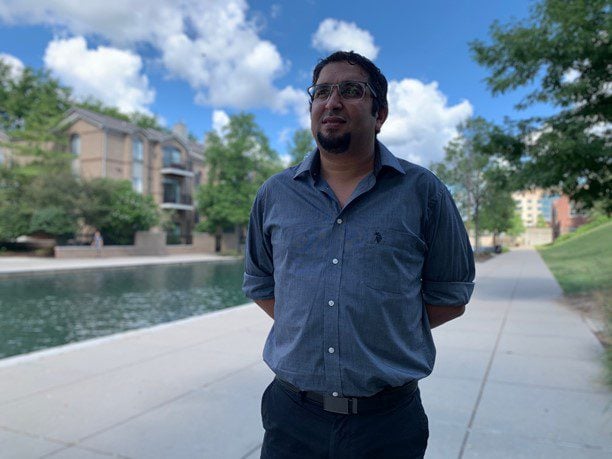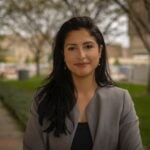The U.S. has secured more doses than the country’s COVID-19 vaccine needs. But around the world, tens of millions of people have no access to vaccines in their home countries. And that makes some people travel thousands of miles to get a shot here in the U.S. — if they can afford it.
Sage Khanna is a real estate entrepreneur who works in Indianapolis. His father still lives in New Delhi. Back in September 2020, his father got sick with COVID-19 and was admitted to the hospital in a remote town outside of Delhi while on a work trip for three weeks. But Khanna couldn’t visit his dad at the time.
“He was really for a second like struggling with his life, quite frankly,” Khanna said.
So, as soon as vaccines started rolling out in the U.S., Khanna flew his dad here to get a shot. His wife did the same with her mother, and so did his sisters-in-law.
“Nobody asked, ‘Are you a citizen or not?’ They’re just giving you the vaccine,” he said.

And that’s been encouraging many to travel to the U.S. for a shot. Like Merhan Omran’s mother.
Omran is Egyptian and lives in Sunbury, Ohio, but her family is back home in Egypt. She said she was anxious because her mother had to fly all the way from Egypt alone.
But her mom, Sara Ismail, has diabetes, and that puts her at an increased risk for COVID-19. Omran has friends who lost their parents to the virus while they were waiting for the vaccine back home, and she didn’t want to risk it with her mom.
“All in all, I think it’s going to be around 25 or 26 hours, including her transit in two countries,” Omran said about her mother’s journey.
That’s 11,000 miles of flying and nearly $1,000 in airfare. Her mom arrived in Ohio on time. And she was on a mission.
She was pretty jetlagged but still showed up on time at a local pharmacy for her Pfizer vaccine dose. Omran kept her company.
“Even though my mom is considered a senior, and with the underlying conditions, she deserves to be given priority,” Omran said. “But in Egypt, this doesn’t happen.”
And that’s because the supply of COVID-19 vaccines is very limited in countries like Egypt. In fact, you can register for a vaccine there but end up waiting for six months to be called for a shot. Even then, you’re most likely going to receive a vaccine that is not approved in the U.S., such as the Chinese Sinopharm vaccine.
And it’s not just Egypt. Less than 3% of Africa (where Egypt is located) is fully vaccinated. The global vaccine disparity is stark — some countries have virtually no vaccines at all.
The U.S. has managed to fully vaccinate 54% of its eligible population, and 64% got at least one dose. Still, this leaves tens of millions of people who are eligible for a shot but choose not to get one.
“This is really a symptom of a broken system,” said Dr. Tom Frieden, who served as director of the Centers for Disease Control and Prevention from 2009 through 2017.
Frieden is now the CEO of Resolve to Save Lives, a group that works on combating global health issues and is now focused on the COVID-19 pandemic. Frieden said the U.S. government needs to scale up global production of the vaccines — especially mRNA ones — and make sure the mRNA vaccine technology is transferred to other parts of the world.
“Fundamentally, it’s starvation in the midst of plenty,” Frieden said. “And that’s not just ethically unacceptable, that’s epidemiologically hazardous because the spread of COVID means increased risk of more dangerous variants.”
This global vaccine disparity also happens as demand for vaccines has dwindled in the U.S. over the summer, resulting in some wasted doses.
Ahmed Elessawi is a pharmacist at one of the major retailers in rural Indiana.
“Till the month of June, we didn’t waste any shots,” he said. “After that, we started to waste.”
The waste was so high that it was hard to keep track of. And that has made Elessawi sad.
His 60-year-old sister flew from Egypt in June and received her two Pfizer doses. Now she’s back home, sitting outside, soaking in the sun in Egypt as she speaks on a video call.
She said the fact that some people in the U.S. are choosing not to get the vaccine even though it is right at their local next-door pharmacy with no waiting time is just mind boggling.
“It’s so strange, I don’t get it,” she said in Arabic. “I trust the American vaccine, I just do.”
This trust in American science and medicine is something many people outside of the U.S. echo, like Dr. Mohammad Hajjiri, a cardiologist in Mansfield, Ohio.
“For my family members, if we had the luxury of bringing them here to get the vaccine, then I absolutely would have done that,” Hajjiri said.
His family is in Jordan and Syria without valid U.S. visas, so they can’t get a vaccine here. He said back home people may not be big fans of U.S. foreign policy, but they trust American science and medicine over almost any other country.
“Medicine in the United States has a very strong brand,” Hajjiri said. “People trust doctors who are trained in the U.S.”
But this also means that misinformation that starts in the U.S. is weaponized overseas and is more potent than misinformation coming out of other places. Hajjiri talked about one popular American doctor whose videos are on social media and some conservative channels. He said those videos are circulating all over the Arab world on WhatsApp.
“In Jordan … they’re like, ‘No, I heard about this American doctor who says that this is going to alter your DNA; that there’s a little chip in there,’” he said.
Beside his clinical and research duties as a physician, Hajjiri uses social media and posts in conversational Arabic language to debunk some of the viral misinformation about COVID-19 and vaccines back home.
But he says the U.S. government needs to combat such misinformation before more damage is done globally — so that when more vaccines do make it to countries now lacking them, people would roll up their sleeves for a shot.
Contact health equity reporter Farah Yousry at fyousry@wfyi.org and follow her on Twitter: @Farah_Yousrym.
This story is produced as part of a collaboration between WFYI, Side Effects Public Media and The Indianapolis Recorder.








